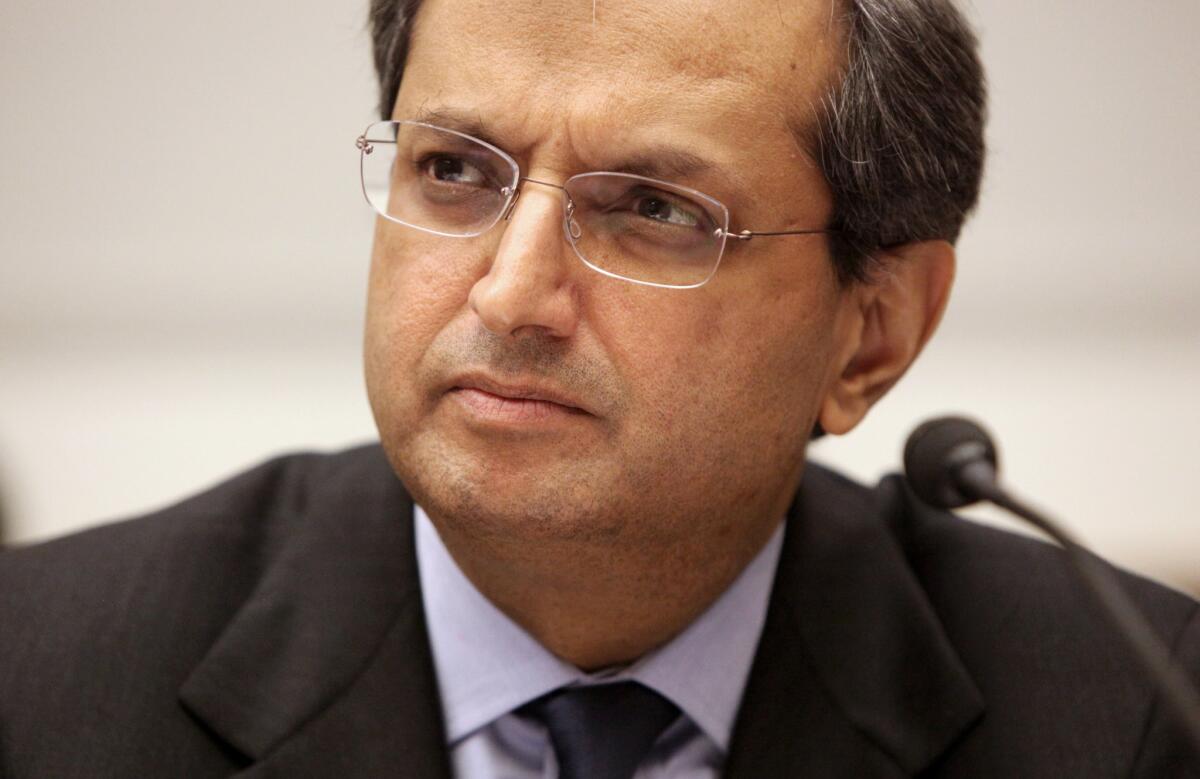Citigroup shareholders’ vote on exec pay sends a message

- Share via
The shareholder rejection of Citigroup Inc. Chief Executive Vikram Pandit’s $15-million pay package has some on Wall Street wondering if the same fate might be in store for the heads of other big U.S. banks.
Both Wells Fargo & Co. and Bank of America Corp. will ask shareholders in the coming weeks to vote on a “say on pay” proposal. Corporate governance experts and activist shareholders expect that these votes will capture even more attention now that Citi’s shareholders have said they want Pandit’s compensation to be dialed back.
Financial institutions have been forced to hold these votes as part of reform laws passed after the financial crisis. Though they are not binding, the votes could leave corporate boards squirming as they choose between cutting the compensation or ignoring shareholders who essentially own the companies.
“Here we have the majority of shareholders indicating frustration with the overall level of compensation for executives still working at a major company,” said Brandon Rees, acting director of investments at the AFL-CIO. “If it can happen at Citigroup it can happen anywhere, particularly at other big financial firms.”
Last year, amid continuing outrage over executive pay, shareholders cast more than 40 negative “say on pay” votes, Rees said. Most of those votes were at small companies, though some big names included technology giant Hewlett-Packard Co.
Tuesday’s vote at Citigroup was the first time it hit a major name on Wall Street. About 55% of the shareholders cast votes in favor of lowering Pandit’s salary and bonus package, along with the compensation for other top executives.
After the surprising outcome, Citigroup’s retiring chairman, Richard Parsons, called the rejection “a serious matter” and said the bank’s board and senior management would listen to the concerns of disaffected shareholders. A statement said the bank would “carefully consider their input as we move forward.”
One of the biggest and most activist of those shareholders, the California Public Employees’ Retirement System, said it voted no on the pay measure because Citigroup “has not anchored rewards to performance.”
“We believe the outcome of the vote will have a ripple effect through the industry by sheer power of an example,” a CalPERS spokesman said.
The situation at Citigroup is expected to put more scrutiny on Bank of America and Wells Fargo, analysts said. Wells Fargo will hold its annual meeting Tuesday in San Francisco, and BofA will hold its meeting May 9.
BofA declined to comment. Wells referred to its shareholder proxy, which called executives’ pay “reasonable and appropriate.”
Shareholder advisory firm GMI Ratings of New York noted that Wells Fargo “has similar issues to Citigroup, including the recent $25-billion settlement with the U.S. government over abusive foreclosure practices as well as ongoing issues related to executive compensation policies.”
“Compensation issues at Wells Fargo include high base salaries, including $2.8million for the CEO, and a lack of adequate performance goals,” GMI said in a statement. “For instance, performance share awards pay out even if the company underperforms all of its peers but one. Underperforming the bulk of industry peers should not result in bonus awards.”
Bank of America, the only other bank to receive a twin bailout, saw its stock plunge 58% last year while Chief Executive Brian Moynihan’s compensation more than quadrupled to $8.1 million. The stock has recovered somewhat this year.
Jonathan Finger, a Houston private investor whose family is a significant BofA shareholder, said he would vote no on the pay measure. He wants to protest runaway executive pay — not just at the bank but throughout U.S. businesses.
Finger said he believed that the Charlotte, N.C., company also could feel the wrath of institutional shareholders, many of whom own Bank of America as well as Citi stock.
The Citi vote “could be a watershed event,” Finger said. “I certainly hope it makes compensation committees take hard looks at how they’re doing. And I hope shareholders take a hard look as well. The biggest problem has been complacency among institutional investors.”
Bank of America’s proxy statement said three-quarters of Moynihan’s compensation in 2011 was in stock awards tied to the future performance of the bank. Shareholder activists generally consider such performance-based awards preferable to other awards.
Rosanna Landis Weaver of CtW Investment Group, a pension fund consultant who has criticized Bank of America over past compensation issues, said: “I would be surprised — pleasantly surprised” if shareholders rejected Moynihan’s pay.
But she too said corporate boards would need to heed the message sent by Citigroup’s slap in the face.
“I think in general shareholders are paying much more attention to compensation,” Weaver said. “And that trend is going to continue.”
More to Read
Inside the business of entertainment
The Wide Shot brings you news, analysis and insights on everything from streaming wars to production — and what it all means for the future.
You may occasionally receive promotional content from the Los Angeles Times.











